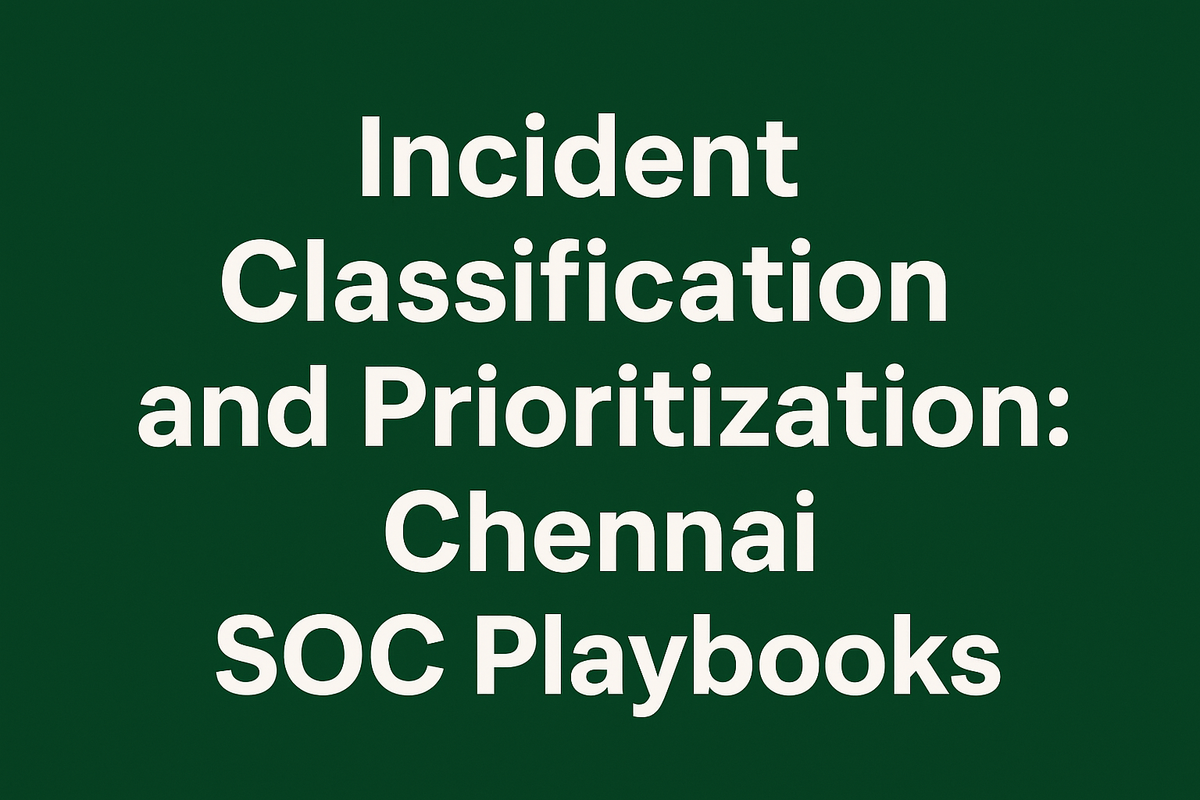Incident Classification and Prioritization: Chennai SOC Playbooks

Introduction
Chennai SOCs, serving multi-tenant and local enterprise networks, require detailed playbooks to systematize incident handling. Incident classification is the process of sorting incoming security alerts or events into categories based on their characteristics, severity, and business impact. Prioritization refers to ranking these incidents to determine which should be addressed first, ensuring critical threats receive swift resolution.
Importance of Classification
A well-defined classification framework reduces confusion and impulsive decision-making, allowing analysts to focus on their expertise and follow prescribed workflows rather than improvising during chaotic situations. In Chennai SOCs, this means analyzing vast SIEM log volumes, categorizing threats (phishing, ransomware, insider threats, network intrusions) based on asset value, regulatory considerations, and risk profile.
Core Steps for Incident Classification
- Establish a taxonomy for common incident types (malware, DDoS, data breach, unauthorized access, and more).
- Consult senior SOC analysts and customize categories for local business context and asset criticality.
- Document properties for each incoming event: affected system, user, asset/business impact, compliance risks.
- Leverage SOAR platforms or configuration management databases to automate mapping and classification.
Prioritization Strategies
Prioritization criteria must be objective, transparent, and tailored for Chennai’s sectoral requirements:
- Severity: How damaging is the incident (data loss, service disruption, reputational impact)?
- Scope: How many systems, users, or clients are impacted?
- Regulatory/Compliance: Which incidents violate local laws (e.g., Indian IT Act), or threaten sensitive data?
- Business Impact: Is there direct financial, operational, or customer service risk?
- Automation: Use incident management software to score and rank incidents for consistent triage and escalation.
Building SOC Playbooks
Effective playbooks contain specific sections to guide Chennai SOC teams:
- Detection and Reporting: Define detection methods and classification channels.
- Incident Analysis: Outline detailed procedures for analyzing classified events by category.
- Containment, Eradication, and Recovery: Map out step-by-step responses for each prioritized incident type.
- Communication Plan: Internal and external communication templates for escalations, updates, and regulatory notifications.
- Continuous Improvement: Post-incident reviews, KPI tracking, root cause analysis, and lessons learned for adapting playbooks to new threats.
Chennai-Specific Considerations
- Multi-tenant SOCs may need granular classification for client-specific risks (BFSI, manufacturing, IT services).
- Include regional regulatory frameworks and compliance checklists (DISHA, CERT-In reporting requirements).
- Consider local threat vectors, such as common phishing campaigns or supply chain risks relevant to the Chennai enterprise ecosystem.
- Tailor playbooks to support both high-volume SIEM log environments and targeted, manual investigations.
Continuous Optimization
A vibrant SOC must continually refine its classification and prioritization frameworks. This means tracking incident frequency and impact, updating categories and escalation policies, using machine learning for improved classification, and regularly training staff in emerging threat patterns.
Conclusion
For Chennai SOCs, structured incident classification and prioritization within playbooks drive faster detection, efficient resource allocation, compliance adherence, and overall cyber resilience. By continually refining frameworks and leveraging automation, SOC operators remain proactive in the face of evolving cyber threats.
Take the Next Step with CodeSecure Solutions
Cyber threats are growing more sophisticated every day. With a trusted partner by your side, you can safeguard your business while focusing on what truly matters—growth and innovation.
At CodeSecure Solutions, we deliver comprehensive cybersecurity services in Chennai, uniquely tailored for startups, SMEs, and enterprises:
- Vulnerability Assessment & Penetration Testing (VAPT)
- Network Security Solutions
- Compliance Support (ISO 27001, PCI-DSS, HIPAA, DPDP Act, GDPR)
- Cloud & Endpoint Protection
- Security Awareness Training
No matter your industry or size, CodeSecure customizes solutions to fit your needs—ensuring your data, reputation, and operations remain secure.
Ready to Strengthen Your Defenses?
- 📞 Call: +91 73584 63582
- ✉️ Email: [email protected]
- 🌐 Visit: www.codesecure.in
Stay secure. Stay informed. Choose CodeSecure Solutions—your partner in cyber resilience.
